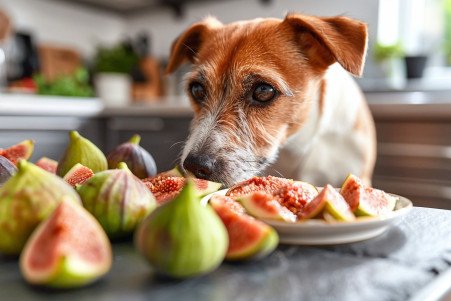Can Dogs Eat Fig Newtons? Decoding the Risks and Alternatives
29 February 2024 • Updated 27 February 2024

If you’re thinking about giving your dog a sweet treat, you may be wondering about Fig Newtons. While dogs can eat Fig Newtons in small amounts, it’s not a good idea. The high sugar and calorie content in Fig Newtons can cause health problems like obesity and diabetes in dogs.
If you want to give your dog a fig-based snack, plain figs are a better option, but you should still talk to your vet first.
This article will use veterinary information and nutritional research to help you better understand what happens when dogs eat human food like Fig Newtons. It will cover what dogs need in their diets, the potential dangers of the ingredients in these foods, and some other options that are better for your pet.
By looking at scientific research and advice from experts in dog nutrition, we’ll help you figure out how to give your dog a sweet snack in a safe and healthy way.
Can dogs eat Fig Newtons?
Deciphering the Diet Dilemma: Fig Newtons in a Dog’s World
In addition to figs, Fig Newtons are made with whole wheat flour, sugar, and corn syrup—all of which are harmful to dogs. Hepper says these ingredients are high in calories, which can lead to obesity, a concern that’s backed up by VCA Hospitals.
In addition, the sugar and corn syrup can lead to diabetes, and while the dietary fiber and omega fatty acids in figs can help to offset this risk, Spoiled Hounds says the figs in Fig Newtons are combined with other ingredients that outweigh these benefits.
In addition to the potential for diabetes, dogs that eat Fig Newtons can have allergic reactions or stomach issues because the sugar content in the cookies can cause an upset stomach, vomiting, or diarrhea, according to Petfluence.
While eating one or two Fig Newtons likely won’t cause any serious problems, the cookies don’t provide the nutrients dogs need to maintain a healthy diet.
This is an important reminder that while a food may seem harmless to humans, it can have a host of unintended consequences for dogs. Given the potential impact on a dog’s health, it’s important to think about the full scope of our dietary decisions on our furry friends.
Crafting a Canine-Friendly Diet: More Than Just Fig Newtons
A dog’s diet requires a careful balance of proteins, fats, carbohydrates, vitamins, and minerals. VCA Animal Hospitals notes that these nutrients are important for a dog’s overall health, including the health of their muscles, joints, digestive system, and skin and coat. While Fig Newtons aren’t poisonous, they certainly don’t offer this kind of balance. Instead, they are high in sugar and calories, which are not good for a dog’s health.
In contrast, high-quality dog food, which is defined by the Association of American Feed Control Officials (AAFCO), is formulated to meet certain nutritional standards that ensure that pets get all of the nutrients they need.
As a result, treats should be thought of as a way to supplement a dog’s diet, not take away from it. PetMD explains that while treats can be part of a dog’s diet, they should not take away from the nutritional value of the food that they eat on a daily basis.
Feeding dogs human food like Fig Newtons is problematic because these treats do not offer the macronutrients and micronutrients that dogs need, and they may also offer up sugars and calories that dogs don’t need.
These treats do not offer the macros and micros dogs need and they may also offer up sugars and calories that dogs don’t need. To make sure that we’re helping our dogs thrive, it’s important to make sure that we’re feeding them foods that meet their nutritional needs and that we’re following the guidelines that have been set up by veterinarians.
The Not-So-Sweet Side of Sugar: How Sugar Affects Your Dog’s Health
Although sugar is not poisonous to dogs, it can cause a number of health problems if it is consumed in large amounts. A cautionary note from PetMD warns that too many sugary treats can cause an upset stomach and can also result in long-term issues like obesity, metabolic changes, and diabetes.
In more extreme cases, dogs can even develop pancreatitis, which can be life-threatening. As a result, experts recommend that no more than 10% of a dog’s daily caloric intake come from sugar.
The impact of giving your dog a sugary snack every once in a while versus doing it on a regular basis is clear. While the occasional treat may not be a problem, consistently giving your dog high-sugar snacks like Fig Newtons can have a negative impact on your dog’s health, including their dental health.
To avoid this, dog owners should choose treats that are lower in sugar. Instead, fresh fruit with natural sugars, which are similar to those found in a well-balanced dog food diet, can be a better option in moderation, allowing your dog to indulge without sacrificing their health.
Give Your Dog Nutritious Treats
If you’re looking for treats for your dog, there are plenty of healthy options to Fig Newtons. Dogs can eat a wide variety of fruits and vegetables as treats. According to PetMD, fresh figs are safe for dogs to eat in small amounts and can provide vitamins and minerals.
You can cut them up and use them as a topper or stuff them in a toy and freeze them for a fun, cool treat.
Making your own dog treats is another great way to make sure that the snacks you’re giving your dog are healthy and safe. You can find easy recipes that use dog-safe ingredients like pumpkin, peanut butter, or oats. Make sure to always check with your vet before adding anything new to your dog’s diet to make sure it’s safe and suitable for your dog’s individual health requirements.
Keep an eye on your dog for any signs of tummy trouble when you give them new treats. Spoiled Hounds notes that signs like diarrhea or vomiting can be a sign of a problem, especially when you’re introducing a new ingredient to your dog. By choosing healthy treats and paying close attention to how your dog reacts, you can give your dog treats that they’ll love without compromising their health.
How to Help Your Dog’s Upset Stomach
Digestive problems can occur in dogs when they eat something outside of their normal diet, especially if that something is a human food like Fig Newtons. In this case, dogs will typically show signs of digestive upset like drooling, vomiting, diarrhea, loss of appetite, or abdominal pain, according to the Merck Veterinary Manual. Other symptoms like bloating or straining to defecate are more obvious signs of a digestive system issue.
To avoid these uncomfortable situations, make sure to keep snacks like Fig Newtons away from your dog and only feed them a diet that is appropriate for dogs. If your dog does eat Fig Newtons, make sure to watch them closely for any signs of illness and feed them a bland diet to help calm their stomach, as recommended by Bond Vet.
Make sure to get your dog to the vet if their symptoms are severe, don’t go away, or are accompanied by other symptoms like dehydration or signs of pain. Getting help early can prevent more serious issues and get your dog back to their happy, tail-wagging selves as soon as possible.
Always prioritize your pet’s health by making sure you know what they can and can’t eat and why it’s important to choose treats carefully.
So, Can Dogs Eat Fig Newtons?
To sum it up, while Fig Newtons aren’t toxic to dogs, they aren’t recommended for your dog’s diet. The high sugar content and other ingredients like wheat flour and corn syrup can lead to a number of health problems including obesity, diabetes, and digestive issues.
Our investigation also highlighted the importance of following the AAFCO’s guidelines for a well-rounded dog diet, and the importance of avoiding human treats that are high in sugar and offer no nutritional value for dogs.
Instead, look for healthier options like plain figs in small amounts, fresh fruits, vegetables, and homemade treats that are made with your dog’s health in mind. Always talk to your vet before adding new foods to your dog’s diet to make sure they are safe and healthy.
As dog parents, it’s important to know and meet our dogs’ nutritional needs. Not only will this help keep them healthy and happy, but it will also help us build a stronger relationship with our faithful friends. After all, when it comes to treats, what’s sweet for us isn’t always safe for our dogs.


